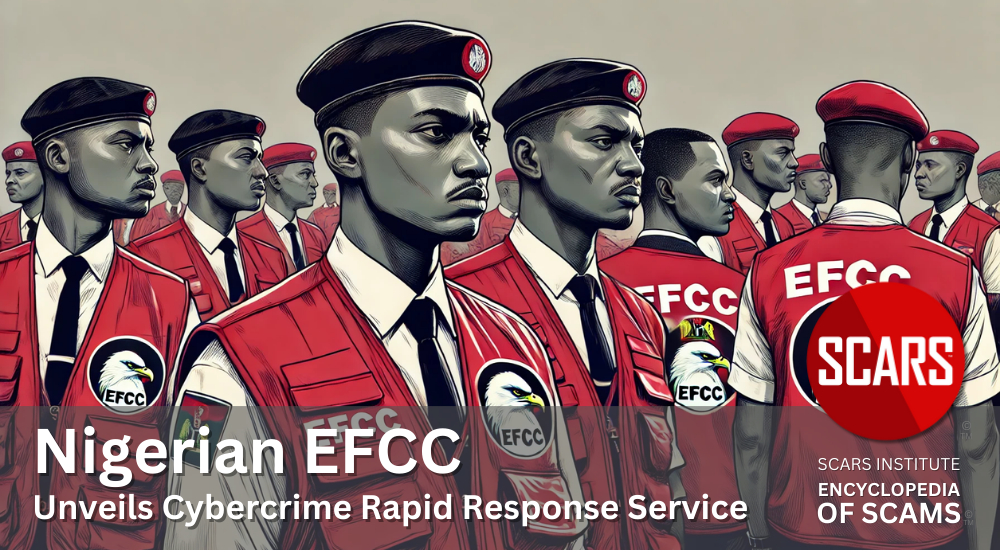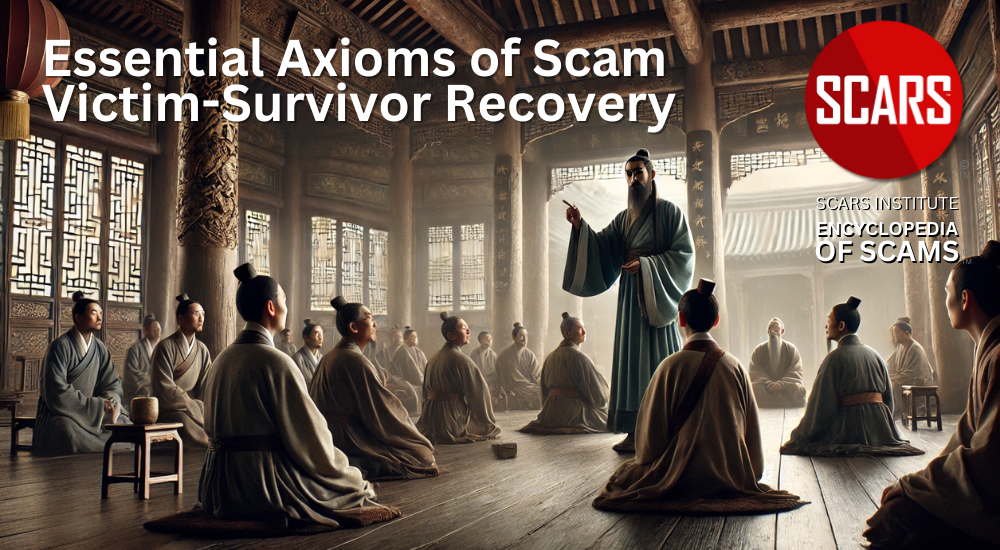
SCARS Institute’s Encyclopedia of Scams™ Published Continuously for 25 Years

The 20 Essential Axioms of Scam Victim-Survivor Recovery
The SCARS Institute’s 20 Essential Axioms for Successful Scam Victim-Survivor Recovery
Philosophy of Scams & Recovery – A SCARS Institute Insight
Authors:
• Vianey Gonzalez B.Sc(Psych) – Psychologist, Certified Deception Professional, Psychology Advisory Panel & Director of the Society of Citizens Against Relationship Scams Inc.
• Tim McGuinness, Ph.D., DFin, MCPO, MAnth – Anthropologist, Scientist, Director of the Society of Citizens Against Relationship Scams Inc.
Article Abstract
The SCARS Institute’s 20 Essential Axioms provide a structured approach for scam victim-survivors to navigate the path to recovery. These axioms are core principles designed to help individuals make sense of their experience and guide them toward emotional healing, self-worth, and resilience.
An axiom is a fundamental truth accepted without proof, and for scam survivors, these axioms serve as guiding lights, offering clarity, strength, and perspective. The axioms remind survivors that they are not defined by the scam, that recovery is a journey requiring patience and support, and that they can transform trauma into personal empowerment.
Covering aspects like self-worth, resilience, and the importance of knowledge, these axioms encourage a balanced recovery approach, helping survivors reclaim their identity and move forward with renewed hope. Embracing these principles shifts focus from loss to growth, underscoring that true recovery is about what can be gained through strength, understanding, and the courage to heal.

The SCARS Institute’s 20 Essential Axioms for Successful Scam Victim-Survivor Recovery
What is an Axiom?
An axiom is a fundamental principle or statement that you can accept as true without needing proof.
An axiom is a foundational idea, serving as the starting point for deeper understanding, further action, or personal growth. In fields like mathematics, philosophy, and even personal recovery, axioms provide self-evident truths that don’t require validation. Instead, they act as solid ground upon which more complex beliefs, insights, and healing can be built.
For scam victim-survivors, axioms are crucial guideposts in the journey to recovery. They help you make sense of the trauma, giving direction to your emotional healing and resilience-building. They aren’t necessarily proven facts, but rather essential principles that offer clarity, strength, and guidance as you move forward.
These axioms are inspired by the SCARS Institute Affirmations, authored by Dr. Tim McGuinness, and designed to empower you as you work through the aftermath of a scam.
Essential Axioms for Scam Victim-Survivor Recovery
Recovering from a scam involves far more than reclaiming financial stability. You have to rebuild trust, self-worth, and resilience, often facing feelings of guilt, shame, and betrayal. The following axioms provide you with a foundation for this journey, guiding you from victimhood to survivor status. By internalizing these axioms, you can transform trauma into empowerment and gain new strength and insight.
Note: The order of these axioms is not significant—each holds unique importance.

Axiom 1: You Are a Survivor
Embrace this foundational truth: surviving a scam does not make you weak, naive, foolish, stupid, or gullible. Rather, it shows your strength, courage, and capacity to endure. By identifying as a survivor, you set a tone of resilience and dignity that supports your journey forward.

Axiom 2: You Can Recover from This
Though recovery can feel overwhelming, remember that healing and growth are possible, just not easy or fast. With time, support, and the right mindset, you can restore what was lost emotionally, mentally, and maybe financially. Believe in your potential to navigate this journey with hope and determination.

Axiom 3: Learning Becomes Knowledge, Knowledge Becomes Strength
Understanding scams—how they work, who they target, and why they succeed—forms the basis for resilience, acceptance, and forgiveness. Education transforms painful experiences into empowering knowledge, equipping you to protect yourself and others in the future.

Axiom 4: Understanding Is the Basis for All Axioms
Comprehension is the key to embracing all these principles necessary for your recovery. By understanding the psychological and emotional impacts of scams, as well as how vulnerabilities are exploited, and how these criminals work, you lay the groundwork for meaningful recovery.

Axiom 5: The Scam is Not Your Fault
Self-blame is a common reaction, but the fault lies entirely with the criminal scammer, not with you. Remember that scammers are highly skilled manipulators of trust, your emotions, and your mind. Accepting this truth can help you release guilt and reclaim your self-worth.

Axiom 6: Axios – You are Worthy
Being scammed will typically cause you to question your worth. This axiom reaffirms that your value is not diminished by this experience. Your self-worth is intrinsic and independent of any harm inflicted by a scam. Recognize your worth as you rebuild confidence and identity.

Axiom 7: Recovery Requires a Decision
Recovery requires intention and effort. It requires a commitment. This axiom reminds you that you control your healing journey. Choosing to engage in recovery through therapy, support, or self-care is essential to overcoming trauma and moving forward.

Axiom 8: Accept and Acknowledge the Traumatic and Emotional Impact
Scams cause trauma and leave permanent emotional scars, affecting mental health, relationships, and security. Accepting and processing your emotions—shame, anger, sadness—is essential to healing. Validating your experience allows you to work through feelings constructively.

Axiom 9: Accepting Support Is a Strength, Not a Weakness
Isolation and fear of judgment often follow a scam, but seeking true professional support is a sign of resilience. Reframe reaching out as empowering, whether to friends, family, support providers, or mental health professionals and connect with those who understand your journey.

Axiom 10: Recovery Is a Journey, Not a Destination
Healing is gradual, with progress occurring in stages. Remember that setbacks are normal, and growth takes time. By viewing recovery as ongoing, you give yourself patience and grace to heal fully.

Axiom 11: You Are Not Defined by the Scam
It’s easy to feel that the scam defines you, but it doesn’t. See the scam as one painful event, not as a reflection of your character. Reclaim your identity beyond the trauma. However, how you work on your recovery has a lot to do with your future.

Axiom 12: Education Empowers, but It Is Not a Guarantee
Learning about scams is empowering, but remember that no one is immune. Even well-informed intelligent people can be targeted and expertly deceived. Knowledge is valuable and essential, though not foolproof—accept this to avoid self-blame if future incidents occur. However, not all knowledge is equal, make sure you are getting it from true experts and professionals, not amateurs.

Axiom 13: Forgiveness Is for Your Freedom, Not Theirs
Anger toward the criminals (scammers) is natural, but holding onto it will impede healing. Consider forgiveness—not to absolve the scammer, but to free yourself from emotional burdens, allowing you to move forward more freely.

Axiom 14: Resilience Is Built, Not Built-In
Resilience can be cultivated through self-care, supportive relationships, support and recovery programs, focused learning, and positive coping strategies. By recognizing this, you can actively build resilience, transforming recovery into a process of personal growth and strength.

Axiom 15: Every Setback Holds the Seeds of Growth
Though painful, scams often bring unexpected opportunities for growth – this is called ‘traumatic growth.’. Reflect on ways you may have rediscovered your strength and become stronger, wiser, or more compassionate. Viewing setbacks as learning experiences transforms trauma into a foundation for development.

Axiom 16: You Can Protect Yourself Without Losing Trust in Others
Scams make trusting others difficult, but trust is essential to healthy relationships. Just make sure you trust by verifying. This axiom reminds you to develop a balanced approach, rebuilding selective trust to form healthy connections.

Axiom 17: There Is No ‘He’ or ‘She’ in Relationship Scams—Only a Team Behind a Stolen Face
Relationship scams are almost never the work of one person; they’re orchestrated by skilled criminal teams. Recognize that the “person” you engaged with was the “face” of a larger operation, helping you detach emotionally and understand that the scam was calculated, not personal. However, remember that there are exceptions.

Axiom 18: Scammers Do Not Care About Victims—It’s Just Business for Them
For scammers, fraudsters, and cybercriminals, scams are transactional, devoid of empathy or genuine concern. Accepting this truth can be painful but liberating. Detach from any lingering ties by understanding that the scam was purely business to them, not personal.

Axiom 19: Most Scammers Are Not Evil—They Are Ordinary People Doing Terrible Things
It’s easy to see scammers as evil, but most are ordinary people drawn into unethical criminal activities. While this doesn’t excuse them, recognizing the systemic nature of scams can help you avoid being consumed by anger and focus on your own healing.

Axiom 20: No One Can Help You Unless You Let Them
Recovery requires openness to support and healing. To heal, you must set aside anger, rage, or denial, allowing trusted professionals to help. Accepting help is not a weakness but a critical step toward reclaiming control and moving forward.
Conclusion
These axioms provide a roadmap for scam victim-survivors navigating the complexities of recovery. Embrace these principles to shift from vulnerability to empowerment, discovering resilience and growth along the way. Each axiom serves as a stepping stone, helping you to reclaim your life, self-worth, and hope for the future. Ultimately, recovery isn’t only about what was lost—it’s about what can be gained through understanding, strength, and the courage to move forward.
-/ 30 /-
What do you think about this?
Please share your thoughts in a comment below!
Table of Contents
- The SCARS Institute’s 20 Essential Axioms for Successful Scam Victim-Survivor Recovery
- Article Abstract
- The SCARS Institute’s 20 Essential Axioms for Successful Scam Victim-Survivor Recovery
- What is an Axiom?
- Essential Axioms for Scam Victim-Survivor Recovery
- Axiom 1: You Are a Survivor
- Axiom 2: You Can Recover from This
- Axiom 3: Learning Becomes Knowledge, Knowledge Becomes Strength
- Axiom 4: Understanding Is the Basis for All Axioms
- Axiom 5: The Scam is Not Your Fault
- Axiom 6: Axios – You are Worthy
- Axiom 7: Recovery Requires a Decision
- Axiom 8: Accept and Acknowledge the Traumatic and Emotional Impact
- Axiom 9: Accepting Support Is a Strength, Not a Weakness
- Axiom 10: Recovery Is a Journey, Not a Destination
- Axiom 11: You Are Not Defined by the Scam
- Axiom 12: Education Empowers, but It Is Not a Guarantee
- Axiom 13: Forgiveness Is for Your Freedom, Not Theirs
- Axiom 14: Resilience Is Built, Not Built-In
- Axiom 15: Every Setback Holds the Seeds of Growth
- Axiom 16: You Can Protect Yourself Without Losing Trust in Others
- Axiom 17: There Is No ‘He’ or ‘She’ in Relationship Scams—Only a Team Behind a Stolen Face
- Axiom 18: Scammers Do Not Care About Victims—It’s Just Business for Them
- Axiom 19: Most Scammers Are Not Evil—They Are Ordinary People Doing Terrible Things
- Axiom 20: No One Can Help You Unless You Let Them
- Conclusion
LEAVE A COMMENT?
Thank you for your comment. You may receive an email to follow up. We never share your data with marketers.
Recent Comments
On Other Articles
- on Love Bombing And How Romance Scam Victims Are Forced To Feel: “I was love bombed to the point that I would do just about anything for the scammer(s). I was told…” Feb 11, 14:24
- on Dani Daniels (Kira Lee Orsag): Another Scammer’s Favorite: “You provide a valuable service! I wish more people knew about it!” Feb 10, 15:05
- on Danielle Delaunay/Danielle Genevieve – Stolen Identity/Stolen Photos – Impersonation Victim UPDATED 2024: “We highly recommend that you simply turn away form the scam and scammers, and focus on the development of a…” Feb 4, 19:47
- on The Art Of Deception: The Fundamental Principals Of Successful Deceptions – 2024: “I experienced many of the deceptive tactics that romance scammers use. I was told various stories of hardship and why…” Feb 4, 15:27
- on Danielle Delaunay/Danielle Genevieve – Stolen Identity/Stolen Photos – Impersonation Victim UPDATED 2024: “Yes, I’m in that exact situation also. “Danielle” has seriously scammed me for 3 years now. “She” (he) doesn’t know…” Feb 4, 14:58
- on An Essay on Justice and Money Recovery – 2026: “you are so right I accidentally clicked on online justice I signed an agreement for 12k upfront but cd only…” Feb 3, 08:16
- on The SCARS Institute Top 50 Celebrity Impersonation Scams – 2025: “Quora has had visits from scammers pretending to be Keanu Reeves and Paul McCartney in 2025 and 2026.” Jan 27, 17:45
- on Scam Victims Should Limit Their Exposure To Scam News & Scammer Photos: “I used to look at scammers photos all the time; however, I don’t feel the need to do it anymore.…” Jan 26, 23:19
- on After A Scam, No One Can Tell You How You Will React: “This article was very informative, my scams happened 5 years ago; however, l do remember several of those emotions and/or…” Jan 23, 17:17
- on Situational Awareness and How Trauma Makes Scam Victims Less Safe – 2024: “I need to be more observant and I am practicing situational awareness. I’m saving this article to remind me of…” Jan 21, 22:55
ARTICLE META
Important Information for New Scam Victims
- Please visit www.ScamVictimsSupport.org – a SCARS Website for New Scam Victims & Sextortion Victims
- Enroll in FREE SCARS Scam Survivor’s School now at www.SCARSeducation.org
- Please visit www.ScamPsychology.org – to more fully understand the psychological concepts involved in scams and scam victim recovery
If you are looking for local trauma counselors please visit counseling.AgainstScams.org or join SCARS for our counseling/therapy benefit: membership.AgainstScams.org
If you need to speak with someone now, you can dial 988 or find phone numbers for crisis hotlines all around the world here: www.opencounseling.com/suicide-hotlines
A Note About Labeling!
We often use the term ‘scam victim’ in our articles, but this is a convenience to help those searching for information in search engines like Google. It is just a convenience and has no deeper meaning. If you have come through such an experience, YOU are a Survivor! It was not your fault. You are not alone! Axios!
A Question of Trust
At the SCARS Institute, we invite you to do your own research on the topics we speak about and publish, Our team investigates the subject being discussed, especially when it comes to understanding the scam victims-survivors experience. You can do Google searches but in many cases, you will have to wade through scientific papers and studies. However, remember that biases and perspectives matter and influence the outcome. Regardless, we encourage you to explore these topics as thoroughly as you can for your own awareness.
Statement About Victim Blaming
SCARS Institute articles examine different aspects of the scam victim experience, as well as those who may have been secondary victims. This work focuses on understanding victimization through the science of victimology, including common psychological and behavioral responses. The purpose is to help victims and survivors understand why these crimes occurred, reduce shame and self-blame, strengthen recovery programs and victim opportunities, and lower the risk of future victimization.
At times, these discussions may sound uncomfortable, overwhelming, or may be mistaken for blame. They are not. Scam victims are never blamed. Our goal is to explain the mechanisms of deception and the human responses that scammers exploit, and the processes that occur after the scam ends, so victims can better understand what happened to them and why it felt convincing at the time, and what the path looks like going forward.
Articles that address the psychology, neurology, physiology, and other characteristics of scams and the victim experience recognize that all people share cognitive and emotional traits that can be manipulated under the right conditions. These characteristics are not flaws. They are normal human functions that criminals deliberately exploit. Victims typically have little awareness of these mechanisms while a scam is unfolding and a very limited ability to control them. Awareness often comes only after the harm has occurred.
By explaining these processes, these articles help victims make sense of their experiences, understand common post-scam reactions, and identify ways to protect themselves moving forward. This knowledge supports recovery by replacing confusion and self-blame with clarity, context, and self-compassion.
Additional educational material on these topics is available at ScamPsychology.org – ScamsNOW.com and other SCARS Institute websites.
Psychology Disclaimer:
All articles about psychology and the human brain on this website are for information & education only
The information provided in this article is intended for educational and self-help purposes only and should not be construed as a substitute for professional therapy or counseling.
While any self-help techniques outlined herein may be beneficial for scam victims seeking to recover from their experience and move towards recovery, it is important to consult with a qualified mental health professional before initiating any course of action. Each individual’s experience and needs are unique, and what works for one person may not be suitable for another.
Additionally, any approach may not be appropriate for individuals with certain pre-existing mental health conditions or trauma histories. It is advisable to seek guidance from a licensed therapist or counselor who can provide personalized support, guidance, and treatment tailored to your specific needs.
If you are experiencing significant distress or emotional difficulties related to a scam or other traumatic event, please consult your doctor or mental health provider for appropriate care and support.
Also read our SCARS Institute Statement about Professional Care for Scam Victims – click here to go to our ScamsNOW.com website.
















These are wonderful axioms and I could see how my journey to recovery progressed when I applied them.
Thank you
EXCELENTE!!!!